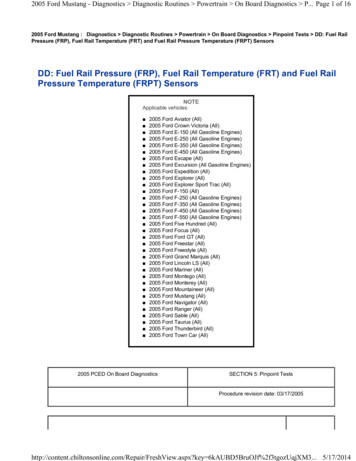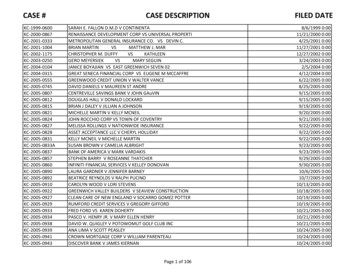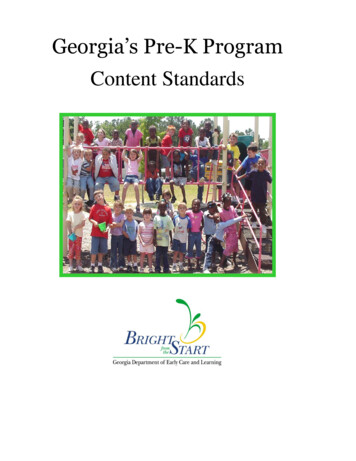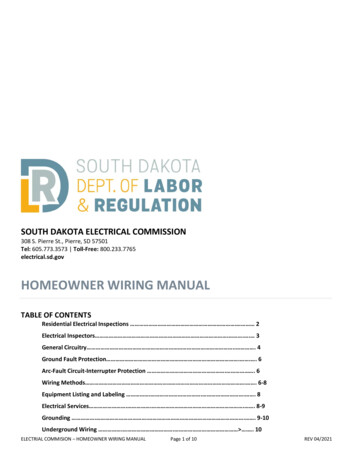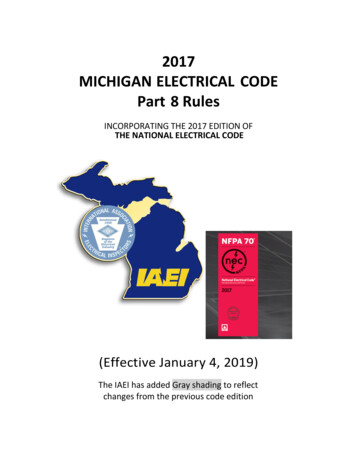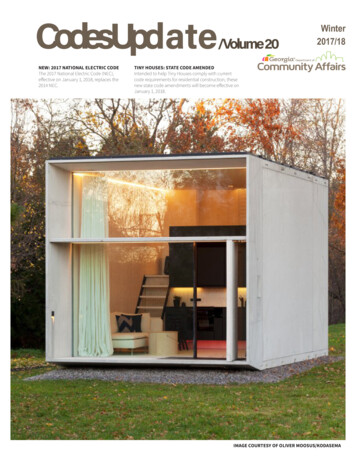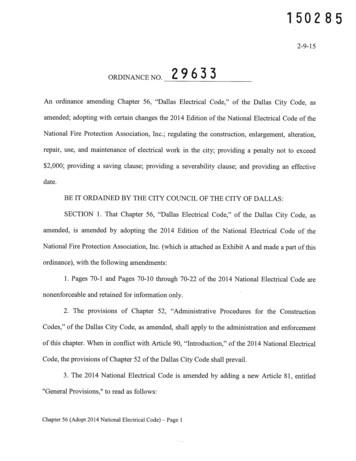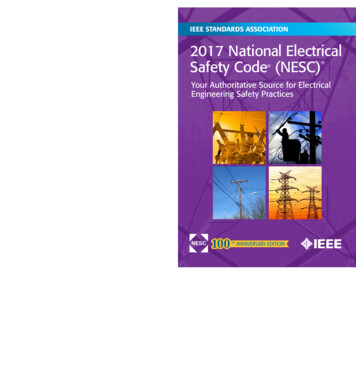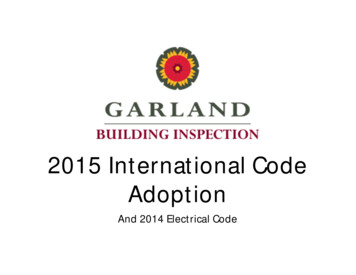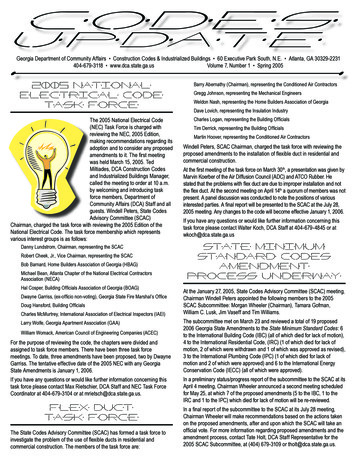
Transcription
Georgia Department of Community Affairs Construction Codes & Industrialized Buildings 60 Executive Park South, N.E. Atlanta, GA 30329-2231404-679-3118 www.dca.state.ga.usVolume 7, Number 1 Spring 20052005 NATIONALELECTRICAL CODETASK FORCEThe 2005 National Electrical Code(NEC) Task Force is charged withreviewing the NEC, 2005 Edition,making recommendations regarding itsadoption and to consider any proposedamendments to it. The first meetingwas held March 15, 2005. TedMiltiades, DCA Construction Codesand Industrialized Buildings Manager,called the meeting to order at 10 a.m.by welcoming and introducing taskforce members, Department ofCommunity Affairs (DCA) Staff and allguests. Windell Peters, State CodesAdvisory Committee (SCAC)Chairman, charged the task force with reviewing the 2005 Edition of theNational Electrical Code. The task force membership which representsvarious interest groups is as follows:Danny Lundstrom, Chairman, representing the SCACRobert Cheek, Jr., Vice Chairman, representing the SCACBob Barnard, Home Builders Association of Georgia (HBAG)Michael Bean, Atlanta Chapter of the National Electrical ContractorsAssociation (NECA)Hal Cosper, Building Officials Association of Georgia (BOAG)Dwayne Garriss, (ex-officio non-voting), Georgia State Fire Marshal’s OfficeDoug Hansford, Building OfficialsCharles McMurtrey, International Association of Electrical Inspectors (IAEI)Larry Wolfe, Georgia Apartment Association (GAA)William Womack, American Council of Engineering Companies (ACEC)For the purpose of reviewing the code, the chapters were divided andassigned to task force members. There have been three task forcemeetings. To date, three amendments have been proposed, two by DwayneGarriss. The tentative effective date of the 2005 NEC with any GeorgiaState Amendments is January 1, 2006.If you have any questions or would like further information concerning thistask force please contact Max Rietschier, DCA Staff and NEC Task ForceCoordinator at 404-679-3104 or at mrietsch@dca.state.ga.us.FLEX DUCTTASK FORCEThe State Codes Advisory Committee (SCAC) has formed a task force toinvestigate the problem of the use of flexible ducts in residential andcommercial construction. The members of the task force are:Barry Abernathy (Chairman), representing the Conditioned Air ContractorsGregg Johnson, representing the Mechanical EngineersWeldon Nash, representing the Home Builders Association of GeorgiaDave Lovich, representing the Insulation IndustryCharles Logan, representing the Building OfficialsTim Derrick, representing the Building OfficialsMartin Hoover, representing the Conditioned Air ContractorsWindell Peters, SCAC Chairman, charged the task force with reviewing theproposed amendments to the installation of flexible duct in residential andcommercial construction.At the first meeting of the task force on March 30th, a presentation was given byMarvin Koerber of the Air Diffusion Council (ADC) and ATCO Rubber. Hestated that the problems with flex duct are due to improper installation and notthe flex duct. At the second meeting on April 14th a quorum of members was notpresent. A panel discussion was conducted to note the positions of variousinterested parties. A final report will be presented to the SCAC at the July 28,2005 meeting. Any changes to the code will become effective January 1, 2006.If you have any questions or would like further information concerning thistask force please contact Walter Koch, DCA Staff at 404-679-4845 or atwkoch@dca.state.ga.usSTATE MINIMUMSTANDARD CODESAMENDMENTPROCESS UNDERWAYAt the January 27, 2005, State Codes Advisory Committee (SCAC) meeting,Chairman Windell Peters appointed the following members to the 2005SCAC Subcommittee: Morgan Wheeler (Chairman), Tamara Gofman,William C. Lusk, Jim Vaseff and Tim Williams.The subcommittee met on March 23 and reviewed a total of 19 proposed2006 Georgia State Amendments to the State Minimum Standard Codes: 6to the International Building Code (IBC) (all of which died for lack of motion),4 to the International Residential Code, (IRC) (1 of which died for lack ofmotion, 2 of which were withdrawn and 1 of which was approved as revised),3 to the International Plumbing Code (IPC) (1 of which died for lack ofmotion and 2 of which were approved) and 6 to the International EnergyConservation Code (IECC) (all of which were approved).In a preliminary status/progress report of the subcommittee to the SCAC at itsApril 4 meeting, Chairman Wheeler announced a second meeting scheduledfor May 25, at which 7 of the proposed amendments (5 to the IBC, 1 to theIRC and 1 to the IPC) which died for lack of motion will be re-reviewed.In a final report of the subcommittee to the SCAC at its July 28 meeting,Chairman Wheeler will make recommendations based on the actions takenon the proposed amendments, after and upon which the SCAC will take anofficial vote. For more information regarding proposed amendments and theamendment process, contact Tate Holt, DCA Staff Representative for the2005 SCAC Subcommittee, at (404) 679-3109 or tholt@dca.state.ga.us.
MARK YOUR CALENDARSJUNE4 – 10 National Fire Prevention Association Conference and Exposition – Las Vegas, NV27-30 National Workshop on State Building Energy Codes – Austin, TXJULYIf you have any meetings that youwould like to include in this newsletter, please contact theConstruction Codes Section at404-679-3118 orlmassey@dca.state.ga.us.10-13 Georgia State Inspectors Association – Jekyll Island, GA14Industrialized Buildings Advisory Committee Meeting @ DCA20-22 Georgia International Association of Electrical Inspectors– Young Harris (Brasstown Valley Resort)28State Codes Advisory Committee Meeting @ DCASEPTEMBER25 – Oct. 2International Code Council Annual Conference – Detroit, MICODY SAYSDCA will begin the process ofadopting the 2006 Editions ofthe International Codes(Building, Residential, Gas,Plumbing, Mechanical and Fire)in the fall of 2005. Theanticipated effective dateis January 1, 2007.WEB SITES OFINTERESTDepartment of Community Affairswww.dca.state.ga.usEasyLiving Homecm Programwww.easylivinghome.orgInternational Codes Council (ICC)www.intlcode.orgBuilding Officials Association of GAwww.boagcodes.orgState of The DCA launched its new website (still located atwww.dca.state.ga.us), which has been redesignedfor content, appearance and navigability. Toaccess the Construction Codes and IndustrializedBuildings Section webpage, click on the“Construction Codes” link under the programsheadings, which is located at the top of the page.The Georgia State Amendments to the StateMinimum Standard Codes, the Codes UpdateNewsletter and all other construction code relatedinformation may be downloaded from this link. Forquestions regarding the Construction Codesprogram on the webpage call 404-679-3118.
QANDAQUESTION:How can I comply with the Georgia State Energy Code for Buildings?ANSWER:For Residential Construction, you can comply using any one of the (5) following methods:1) REScheck software or trade off worksheet (available on the US Department of Energy website at: www.energycodes.gov) ; or2) Chapter 4 approach of the International Energy Conservation Code (IECC), 2000 Edition with Georgia State Amendments ; or3) Chapter 5 approach of the IECC 2000 Edition with Georgia State Amendments ; or4) Chapter 6 approach of the IECC 2000 Edition with Georgia State Amendments ; or5) “Single Step” Residential Energy Code Compliance (located in the Georgia State Amendments to the IECC 2000 Edition).For Commercial Construction, you can comply using any one of the (4) following methods:1) COMcheck software (available on the US Department of Energy website at: www.energycodes.gov) ; or2) Chapter 7 approach of the IECC 2000 Edition with Georgia State Amendments (ANSI / ASHRAE / IESNA 90.1-2001) ; or3) Chapter 8 approach of the IECC 2000 Edition with Georgia State Amendments ; or4) “Single Step” Commercial Energy Code Compliance (located in the Georgia State Amendments to the IECC 2000 Edition).SPRINKLERS INSTALLED INRESIDENTIAL GARAGESRecently DCA has received several requests for clarification regarding the following 2002 Georgia State Amendment to SectionR309.2, Separation required, of the International Residential Code for One- and Two-Family Dwellings (IRC), 2000 Edition:SECTION R309GARAGES AND CARPORTS*Add exception to Section R309.2 to read as follows:Section R309.2 Separation required.Exception:In garages protected by an automatic sprinkler system installed in accordance with NFPA 13D, a separation is not required.(Effective January 1, 2002)In a memorandum to interested parties, DCA clarified the intent of the 2000 Georgia State Amendment to Section 309.2 of the CABO One and Two FamilyDwelling Code, 1995 Edition, which carried forward verbatim to become the current amendment. The following is excerpted from the memorandum:The intent of the exception is to allow the builder or owner to eliminate the gypsum ceiling by installing sprinkler heads within the garage compartment. A wall should separate the garage from the rest of the residence. Drive under parking areas not separated by a wall shall have the entireceiling area protected by a minimum ½-inch (12.7 mm) gypsum board OR protected by a fire sprinkler system complying with NFPA 13D if adequatecoverage cannot be provided with 6 heads or less.The modified system in garage compartments shall be a wet system connected to the domestic water supply and not exceed 6 heads. A State ofGeorgia Licensed Plumber is allowed to design and install this modified system. Licensed plumbers are also allowed to install a complete NFPA 13Dsystem.The following sections of NFPA 13D should be used when installing sprinklers in a garage compartment: Chapter 2 Water Supply, Sections 2-1, 2-2, and 2-3. Chapter 3 System Components, Sections 3-3.1, 3-3.2, 3-3.3, 3-3.4, 3-3.5, 3-3.6 not including the exception, 3-3.7, 3-4.1, 3-4.3, 3-5.2,3-5.2.1, 3-5.2.2, and 3-5.3. Chapter 4 System Design, Sections 4-1.1, 4-1.2, 4-1.2.1, 4-1.3, 4-1.4.1, 4-1.4.2, 4-1.5, 4-1.6, 4-2.3, 4-4.2, 4-5. Pendent and upright sprinklersshall be positioned so that the deflectors are within 1 inch to 4 inches (25.4 mm to 102 mm) below framing or obstructions. Tables, 3-3.1, 3-3.2, 3-3.5, 3-3.7, 3-5.2.3.The amendment permits the installation of sprinkler systems consisting of six (6) heads or fewer and, if adequate coverage cannot be provided with six (6)heads or fewer, the installation of sprinkler systems consisting of more than six (6) heads. The requirements in NFPA 13D are the same for those consisting of six (6) heads or fewer and those consisting of more than six (6) heads. A modified system shall not exceed six (6) heads unless otherwiseacceptable to the authority having jurisdiction, and a system consisting of more than six (6) heads shall comply with NFPA 13D unless otherwise acceptableContinued next page
to the authority having jurisdiction. Methods of creating a garage compartment or separate compartments are subject to approval by the authority havingjurisdiction.It is important to note that the 1996 Edition of NFPA 13D that was referenced when the amendment was adopted and later clarified is still referenced in thecurrent amendment by transference.Under the Uniform Codes Act, final interpretation of the Georgia State Minimum Standard Codes for construction ultimately lies with the local building official,i.e. the authority having jurisdiction.FOAM BOARD PLASTIC BELOW GRADEThe Georgia State Minimum Standard One and Two Family Dwelling Code is the International Residential Code 2000 Edition with Georgia Amendments. Thecode addresses the use of foam plastics below grade in areas of “very heavy” termite infestation in Section R324.4 Foam Plastic Protection andR404.4.7.2 Termite Hazards, and includes exceptions permitting their use under certain circumstances, such as an approved method of protection. Theseprovisions and exceptions were previously covered in this newsletter (Fall 2001). The subject of how the code applies to insulated concrete forms (ICF’s) wasrecently reviewed and considered by the Department of Agriculture Structural Pest Control Commission (SPCC) and the State Codes Advisory Committee(SCAC) Subcommittee on Proposed Code Amendments in conjunction with a proposal to amend the code.In response to an inquiry regarding the use of expanded polystyrene insulation, specifically manufactured with borates, as a method for protecting foam in anICF below grade, the SPCC reviewed data regarding the effectiveness of borates in foam. In reviewing the data provided, the SPCC cited a study thatappeared to indicate a significant failure rate for a borate formulation foam-board subjected to termite infestation and determined that it could not recommendits use. The SPCC also noted, however, that it did not have jurisdiction over this determination with respect to building codes.As a result of the SPCC findings, an amendment to the code was submitted to the SCAC to eliminate the exception to the prohibition of foam use below grade(Section 324.4, Exception #2, and Section 404 Foundation Walls, R404.4.7.2, Condition #1) by approved methods of protection. In the SCAC hearing forproposed code amendments, on March 23rd, the SCAC Subcommittee heard from the Home Builders Association of Georgia, industry representatives fromthe Pest Control Association, the Insulating Concrete Form Association, ICF and borate industry members. After the discussion the proponent of theamendment withdrew the proposed change and the code remains as adopted with regards to the protection of foam below grade by approved methods.There currently exist at least two published ICC Evaluation Reports that have been issued that recognize specific borate additives in foam plastic. ICC-ES1006, for Perform Guard EPS, and ICC Legacy Report NER-515, for PolySteel ICFs. ICF foundation walls installed in accordance with Sections R404.4through R404.4.11 that meet the exceptions outlined in Section 324.4 and 404.4.7.2, and have a product evaluation report acceptable to the code official maybe approved. Should any additional evaluation reports become available related to the use of foam plastics below grade under the exceptions, they may beconsidered by the Authority Having Jurisdiction in approving the structures that utilize the method indicated. It is important to remember, however, that anycode-compliant method for protecting foam plastic insulation below grade does not preclude the requirements for subterranean termite protection in accordance with Section R324.1 of the Georgia Amendments.GEORGIA DEPT.OF COMMUNITYAFFAIRS 2005QUESTIONAIREOn September 1, 2005 the Georgia Department of Community AffairsConstruction Codes and Industrialized Buildings Programs will be sendingthe 2005 Questionnaire for the Georgia Directory of Building Officials &Codes Enforcement to all building officials, building inspectors, codeenforcement officials and building departments. The completion of thisquestionnaire by all building departments is highly important and will helpthis office better serve local jurisdictions.ERRATA TO 2005GEORGIA STATEAMENDMENTSErrata to the January 1, 2005, Georgia State Amendments to the CABOOne and Two Family Dwelling Code (International Residential Code forOne- and Two-Family Dwellings), 2000 Edition, and January 1, 2005,Georgia State Supplements and Amendments to the International EnergyConservation Code, 2000 Edition, were recently published and are includedherein (see purple inserts). They are also available online in .pdf format atwww.dca.state.ga.us.IB ANGLERe-Certification for Existing BuildingsIndustrialized buildings that have been placed into service under oneoccupancy classification or use and at a later date the building’s ownerwishes to change the use of that building or he sells it to someone else whowishes to move the building to a new location, then that building, as with sitebuilt buildings, will need to be brought into compliance with current buildingcodes for its new location, its new use or occupancy classification.The building owner may use one of the following two methods to bring thebuilding into compliance with current building codes for its new location,new use or new occupancy classification:1. The building owner may obtain building permits from local code officialswho have jurisdiction over the area where the building is located or will belocated. He would then be able to perform all work on the building that isrequired to make it meet current building code requirements for its newlocation or its new occupancy classification. All inspections would beperformed by local code officials. When all work required to bring thebuilding into compliance with code requirements for its new location or itsnew occupancy classification is completed, local code officials would thenissue a Certificate of Occupancy which certifies that the building meetsbuilding code requirements for its new location or its new use or occupancyclassification.Continued next page
2. The building owner may apply to DCA to have his building undergothe re-manufacturing process to get his building re-certified for its newlocation or its new occupancy classification. The re-manufacturing process requires the building owner to choose a third party evaluation andinspection firm from DCA’s list of approved firms. The building ownerwould then be required to provide plans and specifications of the building to the third party evaluation firm for review, and to provide access toany and all portions of the building for inspection, including concealedspaces. All items cited by the third party agency as not being in compliance with current building codes would have to be corrected by thebuilding owner. All work on the building to correct non-code compliantitems would be inspected by the third party agency. When all requiredwork is completed, application may be made to DCA for re-manufactured insignias, which would certify that the building meets currentbuilding codes for its new location and/or occupancy classification.IB ARTICLEIdentifying Components of Industrialized BuildingsThere have been recent concerns raised by local jurisdictions regardingwhat Building and Permit Departments should look for when determining if astructure is an Industrialized Building or a HUD Manufactured Home.There are two components that are placed in various locations inside ofIndustrialized Buildings by the manufacturer that are not applied to HUDManufactured Homes.I. Data PlatesAs per the Rules of the Commissioner of Community Affairs Industrialized Buildings Program, Section 110-2-10-.13 Manufacturer’s Unit DataPlate, the manufacturer must install a data plate on all IndustrializedBuildings which must be mounted in a conspicuous location in the utilityarea or other approved location. The data plate will contain such information as the manufacturer’s name and address, model identificationnumbers, state insignia numbers, construction codes and standards,design criteria and other pertinent information. The location of the dataplate should be written on the submitted building plans or the applicantmust provide the location information.II. InsigniaAs per Section 110-2-10-.01, Insignia Required, every new, remanufactured or construction site office industrialized buildingmanufactured for sale in Georgia or in a state which has a reciprocalagreement with Georgia or an industrialized building manufactured forexport from Georgia shall bear an insignia issued by the IndustrializedBuildings Program. Each unit shall have an insignia assigned andaffixed to the said unit prior to leaving the manufacturing plant or remanufacturing site, unless other authorization is obtained from theIndustrialized Buildings Program. The insignia must also be located in aconspicuous location.Georgia Department of CommunityAffairs Industrialized Buildings InsigniaIf the industrialized building does not have aninsignia or insignias and a data plate installed inthe unit or units, the jurisdiction having authoritycan decline to allow the unit or units deliveredinto their perspective jurisdictions and requestthat the unit or units be returned to the dealer/purchaser or manufacturer.If you have any questions or need additionalinformation contact John Watts at 404-679-5246 or Alonzo Allen at404-679-3102 or by email at ib@dca.state.ga.us.DCA TO BEGINREVIEW OF 2006INTERNATIONALCODESThe Georgia Department of Community Affairs (DCA) will begin the processof adopting the 2006 Editions of the International Codes in the fall of 2005.The process will include:2006 International Building Code2006 International Residential Code for One and Two Family Dwellings2006 International Fuel Gas Code2006 International Mechanical Code2006 International Plumbing CodeThe 2006 International Fire Code will not be reviewed and will be adoptedwith any amendments submitted by the Safety Fire Marshal. The StateCodes Advisory Committee (SCAC) will form five task forces to assist themin adoption of the new code editions. The effective date for the six newInternational Codes will be January 1, 2007.PROFILEDeborah J. Hamlin, ExecutiveOfficer, Building OfficialsAssociation of GeorgiaDeborah began her career in theconstruction industry in 1980 whenshe obtained a job with the generalcontractor renovating the DempseyHotel in Macon, Georgia. Thatled to a position with a prosperous contractor in Atlanta; to followwith other general and subcontractors through the years until 1985,when she accepted the positionas secretary for the “EngineeringDepartment” of the City of Perry,Georgia. However, this position did not only entail duties for the buildingofficial, Mr. Steve Howard at the time, but for the Utilities Department, WaterDepartment, Wastewater Department, Public Works Department, GasDepartment, Recreation Department; and Fire Department, which is whereshe met her husband who was the Fire Chief. Her involvement with BOAGbegan when she assisted Mr. Howard with his duties for the BuildingOfficials Association of Georgia (BOAG) during his tenure on the Board ofDirectors.In 1995, during Mr. Bill Chambless’ tenure as the building official for the Cityof Perry, she made mention that BOAG could be bigger and better than whatit was, as she had been a member since 1985 and that she could accomplish this goal if given the chance. Evidently he remembered her commentsbecause on July 7, 1997, while Mr. Chambless served as President ofBOAG, she took on the responsibilities as BOAG’s Secretary/Treasurer ofthe Association. The Association consisted of 157 members at that time andshe strived to increase that number with every avenue available. Today theAssociation has a total 386 members, which is a great accomplishment forBOAG and the industry as a whole.Deborah no longer works in the code enforcement industry, other than withContinued next page
BOAG. She was promoted within the City of Perry as IT/GIS Manager in the year 2000, all the while providing BOAG services; but her commitment toensuring that the code officials of Georgia have the communication they need is also a primary concern.Deborah has two children and four grandchildren.Bobby McCurdy, Building Official, Dawson CountyBobby is a Georgia native born in Duluth, Georgia and raised in Norcross. Over the years he has spent time in other states and countries but he has alwaysreturned to Georgia.His interest in construction began while he was still in high school. An uncle got him a summer job in the Plumbers Union and after graduation he joined Local# 72. In 1980 Bobby started McCurdy Plumbing Company in Dawsonville. In 1989 he took the job of Plumbing Inspector for Forsyth County. Bobby worked inForsyth County for nine years and in that time was promoted to Building Official and got his first certification.Bobby has taught Plumbing Certification courses at Clayton State College since 1993. These are courses designed to help plumbing inspectors get their ICCcertification. Bobby is currently working with Dawson County.GEORGIA STATEMINIMUM STANDARD CODESJanuary 1, 2005On October 1, 1991, the Uniform Codes Act became effective in Georgia. On July 1, 2004, this Act was revised to make the following eight construction codesmandatory as the Georgia State Minimum Standard Codes. Listed below are the code editions in effect as of January 1, 2005:International Building Code2000 EditionInternational Fuel Gas Code2000 EditionInternational Mechanical Code2000 EditionInternational Plumbing Code2000 EditionNational Electrical Code2002 EditionInternational Fire Code2003 EditionInternational Energy Conservation Code2000 EditionInternational Residential Code2000 EditionAll of the above codes have Georgia Amendments.The Act requires local governments that elect to enforce codes within their jurisdictions to adopt administrative procedures and penalties to locally enforceany of these mandatory codes. Also, any applicable appendices of these codes must be adopted locally in order to be enforceable within a specific localjurisdiction.The Act also made the following optional codes available for local government adoption and enforcement. Local governments choosing to enforce either ofthese optional codes must adopt the code(s) they wish to enforce, as well as administrative procedures and penalties.International Property Maintenance Code2003 EditionInternational Existing Building Code2003 EditionChapters 11 (Energy), 25 through 32 (Plumbing) and 33 through 42 (Electrical) are all deleted from the International Residential Code. Therefore, theInternational Energy Conservation Code, the International Plumbing Code and the National Electrical Code also apply to One and Two Family Dwellings.If you need assistance in establishing or updating a construction codes enforcement program in your area, please contact DCA’s Construction CodesProgram at (404) 679-3118.
2005 NATIONAL ELECTRICAL CODE TASK FORCE The 2005 National Electrical Code (NEC) Task Force is charged with reviewing the NEC, 2005 Edition, making recommendations regarding its adoption and to consider any proposed amendments to it. The first meeting was held March 15, 2005. Ted Miltiades, DCA Construction Codes
